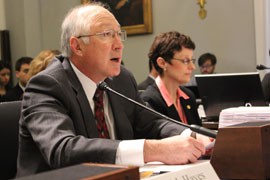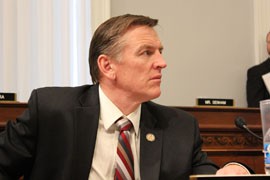Cronkite News has moved to a new home at cronkitenews.azpbs.org. Use this site to search archives from 2011 to May 2015. You can search the new site for current stories.
Interior secretary faces questions over Resolution Copper mine land-swap bill
WASHINGTON – The hearing officially concerned the Department of Interior’s proposed 2013 budget, but most lawmakers instead took turns Wednesday drilling Secretary Ken Salazar on issues from around the country, including one in southeast Arizona.
Rep. Paul Gosar, R-Flagstaff, was one of them, using the House Natural Resources Committee hearing to ask Salazar why his department is opposing HR 1904, a bill that would clear the way for the proposed Resolution Copper Co. mine near Superior.
Gosar called the Southeast Arizona Land Exchange and Conservation Act “jobs legislation” that could create more than 3,000 jobs for the region. The bill would give the government more than 5,000 acres of land from Resolution, in exchange for about 2,400 acres of copper-rich government land.
Salazar said he recognized the economic opportunity in the bill, but that it needs more study. That did little to satisfy a visibly angry Gosar, who called Salazar’s answers “poor excuses.”
“You claim the administration is encouraging economic development in Indian Country and honoring trust responsibilities,” Gosar said. “Yet this administration is considering actions that compromise each of these goals in my state alone.”
Gosar called Interior’s opposition to the land swap counter to the department’s goals.
“The administration is requesting millions of dollars to purchase land across the West under the guise of better management, yet it opposes legislation that allow BLM alone to acquire over 4,000 acres of pristine and highly desired conservation land in Arizona, that will in fact lead to better land management at zero cost to the taxpayer,” Gosar said.
But Salazar, who spent most of the two-hour hearing addressing concerns ranging from offshore drilling to natural gas hydraulic fracking, told Gosar the current version of the bill does not mandate analysis that is important to tribal and environmental concerns.
“I recently visited the site with Sen. (John) McCain and I and know that it is an important opportunity,” Salazar said. “It also is a place where there are very significant tribal concerns that need to be addressed, and also a place where water issues in that area are very important to also address.”
Salazar said his department generally supported a version of the bill that was introduced in the last Congress because it would have required an environmental analysis prior to a land exchange as well as another before mining could begin. Gosar’s bill, which was passed by the House last fall and is awaiting action in the Senate, does not ask for analysis before the land exchange.
“Mr. Gosar’s bill would … direct the exchange to take place without the appropriate environmental analysis,” Salazar said after the hearing. “That analysis should be done in order to address tribal concerns in the area as well as to address issues relating to water in that very water-short area of Arizona.”
The Resolution mine would create an estimated 3,700 jobs and have a $61 billion impact on the state over the coming decades. But its location is considered sacred by nearby tribes. At a Senate hearing last week, the Inter Tribal Council of Arizona said the Resolution mine would not only destroy holy land but it would also contaminate surrounding water sources.
Supporters of the mine insist environmental and cultural issues will be addressed, but that the land swap should go through first because the state cannot wait for the economic boost.
“These are great jobs, this is a billion dollars coming into a state economy,” Gosar said outside the hearing. “This has a ripple effect of getting our economy started back … We need this, and I think that if the administration truly is where they say they are, they’ll pass this bill.”
For the record, the Interior Department’s proposed budget for fiscal 2013 is $11.5 billion, slightly more than its current $11.43 billion budget. Salazar called the 2013 plan “a squeeze budget.”
“We do more with less,” Salazar told the committee, before members began peppering him with non-budget questions.








